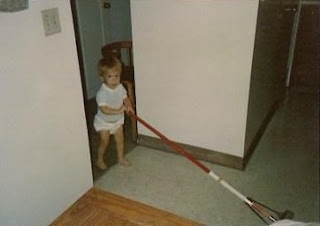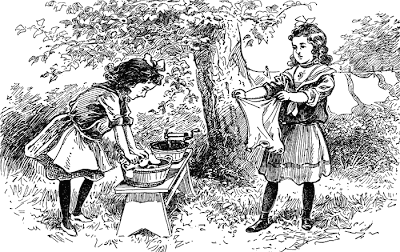Benefits of involving children in household work
My great-grandmother, Amanda Belle, didn’t think twice about asking her twelve children to contribute to the work of the household. With a farm to run and a husband who was often away on his Methodist church circuit riding route, everyone played a vital role in the family survival. Her daughter-in-law, my grandmother, also depended on her children, especially her oldest, my mom. While my grandparents ran a feed and grocery store, my mom took care of the younger siblings at their next door home. All of this was completely normal, and the way things had been done for eons.
Things had changed by the time I was born in 1960. Children of my generation frequently had little responsibility outside of schoolwork, caring for the family pet, and some nominal chores. Our parents had grown up during the Depression and then World War II. Life had been hard for them, and they were determined to make things easier on their children. After all, childhood is short, and kids need time to be kids, right?
So, is requiring children to work, and work reasonably hard, a selfish thing? Should parents instead shoulder all but token amounts of work and allow children to simply pursue sports, music, and pleasures?
Today busy moms still rely on their children to help accomplish the work of the household as a survival strategy. This is a good thing - not only for the smooth running of the home and the mom's sanity, but especially for the benefit of the children themselves! By learning how to do all the tasks necessary to carrying on life in your home, your children will gain useful skills that will last a lifetime. When I grew up we had a weekly housecleaner and an ironing lady. Guess what two domestic jobs I am least equipped in? Yep - ironing and housecleaning! I don't want my children to have to waste time in their adult years learning these basic skills, so by practicing cleaning the bathrooms, mopping the kitchen floor, learning to do their own laundry, and taking care of chickens now, they can use their adult time to take on more exciting challenges.
The second benefit your children gain from learning to work cheerfully and diligently in their youth is good attitudes and habits that can serve them in whatever endeavors they attempt.
Here are some of the character traits and abilities you will be instilling in your children:
- self-discipline
- ability to see a jo to completion
- initaive
- attention to detail
- organization
- responsibility
- working with all their heart, as for the Lord
These good attitudes about work will apply to whatever responsibilities come along - whether it is schoolwork, serving someone in need, working for an employer, or starting a new business.
As your children start to play an important role in the household duties, they will gain a sense of their contribution to the family. There is a true satisfaction in knowing how to do various job and a satisfaction that comes from a job well done. I have one girl who absolutely loves to organize things. She takes pleasure in seeing the kitchen cabinets or the linen closet go from a jumble to peaceful order. She’s amazing! And this is the same child who was my most destructive toddler tornado a dozen years ago!
In the early years, having your children work alongside you can be tiring. You have to keep directing and gently teaching. So often you know you could do the job faster (and better) if you just waited until your little ones were in bed. But, take heart. In time your work of training and teaching will pay off and your children will begin to contribute truly useful work to the family. Older children who have grown up working since their youngest days are a fantastic blessing to a busy home. And the things they learn and the attitudes they cultivate while doing the often very simple tasks around a home will in turn bless them throughout their lives.
Colossians 3: 23, 24 Whatever you do, do your work heartily, as for the Lord rather than for men,knowing that from the Lord you will receive the reward of the inheritance. It is the Lord Christ whom you serve.
Next up: The Apprentice Years - Ages 1-5
Things had changed by the time I was born in 1960. Children of my generation frequently had little responsibility outside of schoolwork, caring for the family pet, and some nominal chores. Our parents had grown up during the Depression and then World War II. Life had been hard for them, and they were determined to make things easier on their children. After all, childhood is short, and kids need time to be kids, right?
So, is requiring children to work, and work reasonably hard, a selfish thing? Should parents instead shoulder all but token amounts of work and allow children to simply pursue sports, music, and pleasures?
Today busy moms still rely on their children to help accomplish the work of the household as a survival strategy. This is a good thing - not only for the smooth running of the home and the mom's sanity, but especially for the benefit of the children themselves! By learning how to do all the tasks necessary to carrying on life in your home, your children will gain useful skills that will last a lifetime. When I grew up we had a weekly housecleaner and an ironing lady. Guess what two domestic jobs I am least equipped in? Yep - ironing and housecleaning! I don't want my children to have to waste time in their adult years learning these basic skills, so by practicing cleaning the bathrooms, mopping the kitchen floor, learning to do their own laundry, and taking care of chickens now, they can use their adult time to take on more exciting challenges.
The second benefit your children gain from learning to work cheerfully and diligently in their youth is good attitudes and habits that can serve them in whatever endeavors they attempt.
 |
| Toddler Andrew trying to mop the kitchen floor. |
- self-discipline
- ability to see a jo to completion
- initaive
- attention to detail
- organization
- responsibility
- working with all their heart, as for the Lord
 |
| Eighteen some years later, Andrew, home from college for a break, still likes to help out. Here he is building a new garden bed one Mother's Day. |
These good attitudes about work will apply to whatever responsibilities come along - whether it is schoolwork, serving someone in need, working for an employer, or starting a new business.
As your children start to play an important role in the household duties, they will gain a sense of their contribution to the family. There is a true satisfaction in knowing how to do various job and a satisfaction that comes from a job well done. I have one girl who absolutely loves to organize things. She takes pleasure in seeing the kitchen cabinets or the linen closet go from a jumble to peaceful order. She’s amazing! And this is the same child who was my most destructive toddler tornado a dozen years ago!
In the early years, having your children work alongside you can be tiring. You have to keep directing and gently teaching. So often you know you could do the job faster (and better) if you just waited until your little ones were in bed. But, take heart. In time your work of training and teaching will pay off and your children will begin to contribute truly useful work to the family. Older children who have grown up working since their youngest days are a fantastic blessing to a busy home. And the things they learn and the attitudes they cultivate while doing the often very simple tasks around a home will in turn bless them throughout their lives.
Colossians 3: 23, 24 Whatever you do, do your work heartily, as for the Lord rather than for men,knowing that from the Lord you will receive the reward of the inheritance. It is the Lord Christ whom you serve.
Next up: The Apprentice Years - Ages 1-5



Comments
And if I may offer a request for the next topic, could you please write about Tips For Helping Small Boys Enjoy The Worship Service? I've been reading some about helping children appreciate the whole Sabbath but I'm looking for some ways to draw them into the service itself.
Enjoy your summer!
Lydia Carter
That's a great topic. I'm not sure how much wisdom I have there, but I have a couple of books that we've found helpful, so I'll see what I can come up with. What are the ages of your boys?
Thanks! Lydia